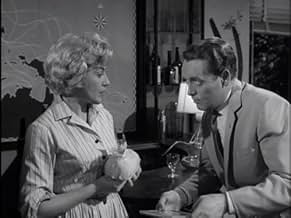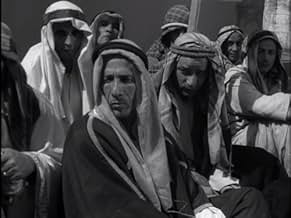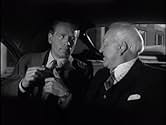IMDb-BEWERTUNG
7,9/10
1494
IHRE BEWERTUNG
Füge eine Handlung in deiner Sprache hinzuJohn Drake is a special operative for NATO, specializing in security assignments against any subversive element which threatened world peace.John Drake is a special operative for NATO, specializing in security assignments against any subversive element which threatened world peace.John Drake is a special operative for NATO, specializing in security assignments against any subversive element which threatened world peace.
Folgen durchsuchen
Empfohlene Bewertungen
I think the "Danger Man" series I remember, with its distinctive racy theme tune, was the later hour-long remake series from 1964 onwards, which would fit in with my own youthful time-line I suppose. Hunting down the show on the web I came across the first episode from 1960 entitled "The View From The Villa", which I was interested to see was co-written by the great Brian Clemens of future "The Avengers" fame.
This episode contained a neat little mystery taking in a murder, the city of Rome, and an enigmatic femme fatale which Patrick McGoohan's John Drake solves with his eye for a painting, all in a brisk 25 minute time-frame. The show, unlike its successor, is pre-Bond so there are no gadgets and there's also an icy detachment from the glamorous and flirtatious ladies he encounters which 007 would never countenance.
No, Drake is there simply to get the job done, which he does with steely aplomb, dispensing what might have been an early catchphrase "Obliged" as he does so. He's handy with his dukes too, but again not in a flashy or contrived way.
McGoohan strolls through the part with laconic ease and as well as elements of the early Bond, you can also see the genesis of Roger Moore's Simon Templar character here, the latter of course with added humour, suavity and raised eyebrow.
I'll certainly make an effort to try to watch more of this entertaining series, confident it will retain the standard of this opening programme.
This episode contained a neat little mystery taking in a murder, the city of Rome, and an enigmatic femme fatale which Patrick McGoohan's John Drake solves with his eye for a painting, all in a brisk 25 minute time-frame. The show, unlike its successor, is pre-Bond so there are no gadgets and there's also an icy detachment from the glamorous and flirtatious ladies he encounters which 007 would never countenance.
No, Drake is there simply to get the job done, which he does with steely aplomb, dispensing what might have been an early catchphrase "Obliged" as he does so. He's handy with his dukes too, but again not in a flashy or contrived way.
McGoohan strolls through the part with laconic ease and as well as elements of the early Bond, you can also see the genesis of Roger Moore's Simon Templar character here, the latter of course with added humour, suavity and raised eyebrow.
I'll certainly make an effort to try to watch more of this entertaining series, confident it will retain the standard of this opening programme.
British spy/adventure series, with 39 half-hour episodes. Patrick McGoohan stars as John Drake, an American operative working for NATO. He travels all over the world on various missions, everything from rescuing high-profile kidnapping victims to thwarting drug rings and smuggling operations, from stopping assassins to solving public health crises. He often goes undercover, adopting the guise of the loud, obnoxious Ugly American type to lower the guard of his enemies. He generally eschews the use of guns, and is positively chaste compared to the womanizing James Bond stereotype. I thought McGoohan was very good in the lead, an unusual mix of honorable man-of-action and quick-witted malcontent. The stories got pretty monotonous by the end of the season, with many of the set-pieces repeated, and the guest cast reappearing as different characters.
The guest cast features many performers who would later appear in the James Bond films, including Lois Maxwell, Donald Pleasence, Robert Shaw, Honor Blackman, Charles Gray, Zena Marshall, Nadja Regin, Walter Gotell, Burt Kwouk, and Anthony Dawson. Other notable guests include Barbara Shelley, Hazel Court, Sam Wanamaker, Mai Zetterling, Nigel Green, George Coulouris, Bevely Garland, Jackie Collins, Judy Carne, Hermione Baddeley, Jack MacGowran, and William Marshall.
The spy adventure was one of the signature genres of the 1960's, and many cite Danger Man as ground zero for the phenomenon. It wasn't the first, but it was the impetus that led to The Avengers on TV, to the James Bond films, as well as the shows The Saint, The Man from U. N. C. L. E., Mission:Impossible, and more. However, the first (and technically only...but more on that in a moment) season wasn't very well received when it aired in the U. S. on CBS, and the show was ended. McGoohan was the first choice to play James Bond in the films, but he thankfully turned it down (too much sex!), and it went to Sean Connery. Meanwhile, after the genre exploded in popularity by the middle of the decade, Danger Man was revived, although changed a great deal. It went to an hour-long format, the character was made a British agent (although the John Drake name was kept), and the US title was held over: Secret Agent, while also adding the hit theme song "Secret Agent Man". This series eventually led to The Prisoner and cult immortality, but that's a story for another day.
The guest cast features many performers who would later appear in the James Bond films, including Lois Maxwell, Donald Pleasence, Robert Shaw, Honor Blackman, Charles Gray, Zena Marshall, Nadja Regin, Walter Gotell, Burt Kwouk, and Anthony Dawson. Other notable guests include Barbara Shelley, Hazel Court, Sam Wanamaker, Mai Zetterling, Nigel Green, George Coulouris, Bevely Garland, Jackie Collins, Judy Carne, Hermione Baddeley, Jack MacGowran, and William Marshall.
The spy adventure was one of the signature genres of the 1960's, and many cite Danger Man as ground zero for the phenomenon. It wasn't the first, but it was the impetus that led to The Avengers on TV, to the James Bond films, as well as the shows The Saint, The Man from U. N. C. L. E., Mission:Impossible, and more. However, the first (and technically only...but more on that in a moment) season wasn't very well received when it aired in the U. S. on CBS, and the show was ended. McGoohan was the first choice to play James Bond in the films, but he thankfully turned it down (too much sex!), and it went to Sean Connery. Meanwhile, after the genre exploded in popularity by the middle of the decade, Danger Man was revived, although changed a great deal. It went to an hour-long format, the character was made a British agent (although the John Drake name was kept), and the US title was held over: Secret Agent, while also adding the hit theme song "Secret Agent Man". This series eventually led to The Prisoner and cult immortality, but that's a story for another day.
In the "View from the Villa" agent John Drake pulls up in what looks like an Aston Martin DB4 or DB5, thus beating Sean Connery to the punch by several years. At least on the screen. I think it also appears in a few other episodes, but I am not certain.
I have spent the last few years slowly catching up on this superb series via net flicks. As other reviewers have noted already the plots were nearly always excellent. The understatement and laconic delivery of Mr. McGoohan a foretelling of others who would try the same style and mostly fail, except for the wonderful Le Carre adaptions, and Mr. Caine's superb Ipcress File. The satire of Establishment figures was often very droll.
In the current editions I am getting from Netflicks the music track is provided by a powerful jazz orchestra. What happened to the superb Harpsichord jazz music that I remember from the original UK broadcasts? So much more subtle and intriguing than the blaring band arrangement, although it does have a period flavor I cant deny.
Mr. McGoohan passed away recently. I will remember him and Danger Man as one of the very influential forces in my teenage years.
I have spent the last few years slowly catching up on this superb series via net flicks. As other reviewers have noted already the plots were nearly always excellent. The understatement and laconic delivery of Mr. McGoohan a foretelling of others who would try the same style and mostly fail, except for the wonderful Le Carre adaptions, and Mr. Caine's superb Ipcress File. The satire of Establishment figures was often very droll.
In the current editions I am getting from Netflicks the music track is provided by a powerful jazz orchestra. What happened to the superb Harpsichord jazz music that I remember from the original UK broadcasts? So much more subtle and intriguing than the blaring band arrangement, although it does have a period flavor I cant deny.
Mr. McGoohan passed away recently. I will remember him and Danger Man as one of the very influential forces in my teenage years.
A low key, but absorbing, TV series of half-hour episodes, it is the first of three putatively related series, the latter two being (a) Secret Agent Man (hour long episodes), and (c) The Prisoner.
In the series, our protagonist John Drake (played by Patrick McGoohan) is an English spy - elegant, skilled, sophisticated, and never at a loss. He breezes through his weekly problem, and we enjoy every second of the short ride!
In my opinion, the series was the undisputed master of its era, and I loved its whimsy, its thoughtfulness, and good plot lines, simply and starkly delivered. The later Harry Palmer movies (with Michael Caine - for example, The Ipcress File) was reminiscent of this same style - austere story line, strongly built around its main character, employing few cinematic effects, yet full of impact.
It has been years since I have seen this series, but it it is still one I remember very fondly.
In the series, our protagonist John Drake (played by Patrick McGoohan) is an English spy - elegant, skilled, sophisticated, and never at a loss. He breezes through his weekly problem, and we enjoy every second of the short ride!
In my opinion, the series was the undisputed master of its era, and I loved its whimsy, its thoughtfulness, and good plot lines, simply and starkly delivered. The later Harry Palmer movies (with Michael Caine - for example, The Ipcress File) was reminiscent of this same style - austere story line, strongly built around its main character, employing few cinematic effects, yet full of impact.
It has been years since I have seen this series, but it it is still one I remember very fondly.
There are so many things Ralph Smart got right in the earliest Danger Man, it's almost a pity he couldn't stick to the commercially problematic 30-minute format. The stories are taut, clever Cold War mystery-thrillers. Within the hurried time constraints it isn't all plot as Smart finds room for characterization and texture, even to interject some interesting ideas and questions. A lot of this is done by way of the mercurial Patrick McGoohan but Smart had no shortage of talented collaborators in directors and actors.
McGoohan's early performances are fluid yet quirky. While he projects a kind of reserved elan, he also draws on a trove of itchy, improvisational mannerisms that allow us into more than a few nooks--not all of them pleasant--of John Drake's anxious cynicism. (McGoohan is to the TV spook what the late Jeremy Brett was to Sherlock Holmes: a perturbable, high-strung exotic, haunted but smirking.) I prefer him here to the more celebrated Prisoner, in fact, where he's customarily arch and lacks the variety of situation and emotional register. His narration is another treat, delivered in one of the most delectably ironic voices in dramatic TV history.
The writing bests most on TV, then or now. The tone in the better scripts is wry, veering toward acid, with more than a hint of melancholy. This is not the Cold War as a stage for Kennedyesque moxie, and certainly not the idiotic glamorization found in Bond, but rather as in Le Carré, a stage for the peeling away of deceptions that are as likely to originate at home as in dens abroad. This is not to say it isn't above the occasional stereotype; see, for instance, the leering North Koreans in the episode The Honeymooners. But a mark of this generally very humane work is that it more typically treats nationalistic conceptions of the enemy with skepticism, and even pits Drake in frustration against his own morally ambiguous NATO bosses. Nor is the day always won, and some seeming victories prove Pyhrric. How refreshing this is to watch in 2007, for obvious reasons.
The production design, fairly cheapo and simplistic, never detracts (charmingly, old file inserts make do for exterior locations) and in fact the studio sets somehow hold surprise delights: here a gloomy early 60s facsimile of a Munich street recalling Carol Reed's chiaroscuro in The Third Man, there the lobby of an International Style hotel with its sexy mid-century modernism. That it's all in gorgeous high-contrast black and white only deepens the interest: shadow play for shadowy deeds.
A word too about the memorable score by Albert Elms, particularly his incidental music. The understated jazz is part and parcel of the sensibility here--aloof and insinuating. There is so much intelligence pulsing through Elms' music and the series as a whole that it seems vaguely unlikely; watching this work, I can't help but admire its virtues while ruing what's become of the medium.
Danger Man in this early incarnation is grown-up art on TV, the likes of which in the U.S., anyway, we rarely hope to find today outside of HBO, practically its last refuge. A treasure.
McGoohan's early performances are fluid yet quirky. While he projects a kind of reserved elan, he also draws on a trove of itchy, improvisational mannerisms that allow us into more than a few nooks--not all of them pleasant--of John Drake's anxious cynicism. (McGoohan is to the TV spook what the late Jeremy Brett was to Sherlock Holmes: a perturbable, high-strung exotic, haunted but smirking.) I prefer him here to the more celebrated Prisoner, in fact, where he's customarily arch and lacks the variety of situation and emotional register. His narration is another treat, delivered in one of the most delectably ironic voices in dramatic TV history.
The writing bests most on TV, then or now. The tone in the better scripts is wry, veering toward acid, with more than a hint of melancholy. This is not the Cold War as a stage for Kennedyesque moxie, and certainly not the idiotic glamorization found in Bond, but rather as in Le Carré, a stage for the peeling away of deceptions that are as likely to originate at home as in dens abroad. This is not to say it isn't above the occasional stereotype; see, for instance, the leering North Koreans in the episode The Honeymooners. But a mark of this generally very humane work is that it more typically treats nationalistic conceptions of the enemy with skepticism, and even pits Drake in frustration against his own morally ambiguous NATO bosses. Nor is the day always won, and some seeming victories prove Pyhrric. How refreshing this is to watch in 2007, for obvious reasons.
The production design, fairly cheapo and simplistic, never detracts (charmingly, old file inserts make do for exterior locations) and in fact the studio sets somehow hold surprise delights: here a gloomy early 60s facsimile of a Munich street recalling Carol Reed's chiaroscuro in The Third Man, there the lobby of an International Style hotel with its sexy mid-century modernism. That it's all in gorgeous high-contrast black and white only deepens the interest: shadow play for shadowy deeds.
A word too about the memorable score by Albert Elms, particularly his incidental music. The understated jazz is part and parcel of the sensibility here--aloof and insinuating. There is so much intelligence pulsing through Elms' music and the series as a whole that it seems vaguely unlikely; watching this work, I can't help but admire its virtues while ruing what's become of the medium.
Danger Man in this early incarnation is grown-up art on TV, the likes of which in the U.S., anyway, we rarely hope to find today outside of HBO, practically its last refuge. A treasure.
Wusstest du schon
- WissenswertesIn this early series, the character of John Drake is clearly defined as being an American. When the character returned for the second Geheimauftrag für John Drake (1964) series, the character had become either British or Irish (exactly which was never settled upon definitively).
- Zitate
John Drake: [Opening titles narration] Every government has its Secret Service branch: America, CIA; France, Deuxieme Bureau; England, MI5. NATO also has its own. A messy job? Well that's when they usually call on me, or someone like me. Oh yes: my name is Drake. John Drake.
- Crazy Credits"Introducing Patrick McGoohan."
- Alternative VersionenIt has been reported that a foreign (non-UK) syndicated version of this series incorporated the American "Secret Agent Man" opening credits used for the later series "Danger Man" (1964), thereby tying the two series together. This has yet to be confirmed.
- VerbindungenFeatured in Six Into One: The Prisoner File (1984)
Top-Auswahl
Melde dich zum Bewerten an und greife auf die Watchlist für personalisierte Empfehlungen zu.
Details
- Erscheinungsdatum
- Herkunftsland
- Offizieller Standort
- Sprache
- Auch bekannt als
- Danger Man
- Drehorte
- Produktionsfirma
- Weitere beteiligte Unternehmen bei IMDbPro anzeigen
- Laufzeit24 Minuten
- Farbe
- Seitenverhältnis
- 1.33 : 1
Zu dieser Seite beitragen
Bearbeitung vorschlagen oder fehlenden Inhalt hinzufügen

Oberste Lücke
What is the Spanish language plot outline for Geheimauftrag für John Drake (1960)?
Antwort








































